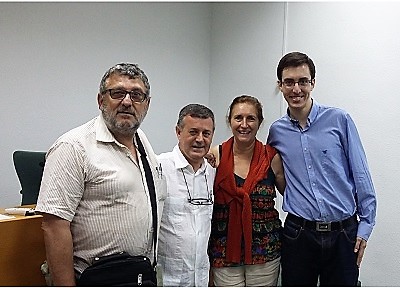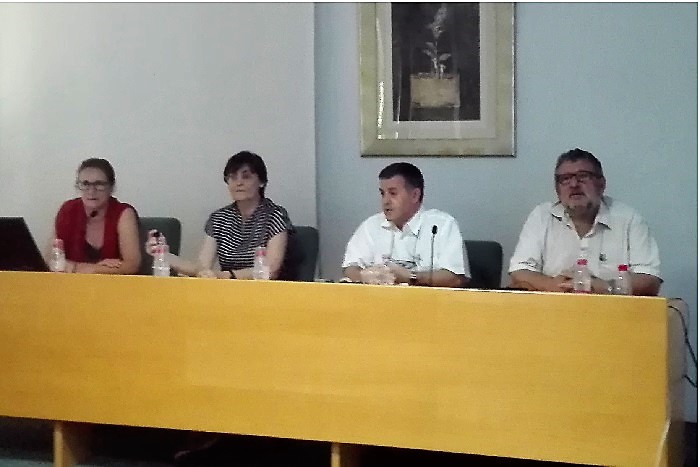A research project led by Pedro R. Gil-Monte, professor of the Department of Social Psychology of the Universitat de València, concludes that the training in relaxation, in cognitive behavioural techniques and the encouragement of social support at work reduce significantly the exposure to psychosocial work risks such as the overload and the work-family conflict. The study, which is funded by the Ministry of Economy and Competitiveness, was presented yesterday. It underlines that the psychosocial intervention improves the health problems resulting from the work stress in primary and secondary teachers of the Valencian Community.

The conclusions of this research project (PSI2013-48185-R, within the Plan Nacional de I+D+i 2013-2016) were presented yesterday Thursday 27 June at the Assembly Hall of the Faculty of Psychology of the Universitat de València with a video that included interviews and images of the sessions. The research group is formed by Pedro R. Gil-Monte, Ester Grau-Alberola, Hugo Figueiredo-Ferraz, Jorge López-Vílchez, Ángel Martínez and Cristina Aguilar. Apart from the members of the group, María Dolores Sancerni, Dean of the Faculty, also took part at the presentation of the project.
The comparison of the obtained results ‘has made it possible to conclude that the training programme has proved to be effective to reduce significantly the levels of role conflict, work overload, interpersonal conflicts and lack of organization justice when it comes to the participants who presented high psychosomatic health disorders related to work’, according to Gil-Monte.
The results have also shown that the training has been effective to improve the work-family reconciliation, the work resources for the job and the personal resources to face the task, like self-efficacy.
As for the consequences of work stress on health, the intervention programme co-ordinated by the researcher Pedro R. Gil-Monte has been effective to reduce significantly the level of the occupational burnout, health psychosomatic disorders, visits to the Doctor and depression symptoms. Moreover, the levels of cortisol at saliva significantly decreased. They were calculates through the CAR method (Cortisol Awakening Response).
‘In conclusion, the intervention programme has decreased the exposure to psychosocial risks at work and has improved the work quality life of the participants’, according to the professor of the UV.
‘The results are a very important empirical support for the claim that psychology academics and professionals have been doing about the need and the urgency of including psychologist assistance within the public health system, especially in primary healthcare with the purpose of promoting the citizen’s health and reducing the social expense in healthcare’, affirms Pedro R. Gil-Monte.
Methodology
The research project took place between March and November 2016 with a sample of 66 professors divided into 2 groups. One of the groups received the training programme whereas the other group did not receive it and was used as a control group. The training programme consisted of 11 sessions developed during 3 months at the rate of one per week. The programme consisted in the learning of relaxation techniques; cognitive behavioural techniques for managing negative thoughts and emotions related to work stress and the occupational burnout such as the negative self-assessment and the senses of guilt; and techniques for the development of the social support at work.
In order to evaluate the results, it was used the UNIPSICO questionnaire. It is a questionnaire that evaluates the psychosocial factors and risks at work and its consequences on health, together with the levels of cortisol at saliva. All the participants answered the questionnaire and gave samples of saliva before and after of the training programme and 3 months after the finalisation.
Research career
Pedro R. Gil-Monte is professor accredited as full professor from the Universitat by the ANECa, of the Department of Social Psychology of the Universitat de València. He is head of the Unit of Psychosocial Research of Organizational Conduct (UNIPSICO) (http://www.uv.es/~unipsico/). His research focuses on the study of working life quality and in the prevention of occupational risks of psychosocial nature. He has authored more than 200 scientific publications about these topics. Among the honours received, it should be emphasised the prize to the trajectory and contribution to research in Latin-America about the psychosocial factors, stress and mental health at work as well as the ‘Distinción 2014 a la realización de trabajos de investigación en prevención de riesgos laborales’ given by the Valencian Institute for Safety and Occupational Health (INVASSAT) of the Valencian Government, among others.
Images:


















